- Qualcomm Launches Snapdragon 4 Gen 2 Mobile Platform
- AMD Launches Ryzen PRO 7000 Series Mobile & Desktop Platform
- Intel Launches Sleek Single-Slot Arc Pro A60 Workstation Graphics Card
- NVIDIA Announces Latest Ada Lovelace Additions: GeForce RTX 4060 Ti & RTX 4060
- Maxon Redshift With AMD Radeon GPU Rendering Support Now Available
ADATA Premier SP550 480GB Solid-State Drive Review
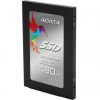
It’s easy to think that all budget SSDs perform the same, but ADATA proves otherwise with its Premier SP550. This TLC drive looks the part of modest SSD, but under the hood, it has a trick up its sleeve: 8GB SLC cache. The best part? That perk doesn’t add much to the cost of the drive, making this one SSD well worth looking out for.
Page 2 – Test Suite, PC Mark, Iometer & AS SSD
Benchmark Programs
Futuremark PCMark 08: Normal settings are used including the default setting of three runs. This gives us an extended test that takes roughly 45 minutes to complete resulting in a sustained load that will thermally challenge drives. The free (demo) version is available on Steam for public use.
AS SSD: This handy little utility was custom-written for solid-state drives. We selected this program as by default it utilizes incompressible data and bypasses the Windows cache. This is another free program anyone can use to quickly test or verify normal performance of an SSD, available here.
ATTO: The bar graphs generated by this utility provide a huge amount of data in a condensed format. It is extremely handy for detecting problematic file sizes, performance bottlenecks, or simply inconsistent performance. Though this is significantly less of a problem today as solid-state drives have matured it is an essential piece of any benchmark kit.
RoboCopy: This is Windows command-line utility included in most versions of Windows and provides for features beyond the default file copy handling of Windows. More information is available here. Due to a quick in Windows caching tests are run once before the system is restarted to avoid caching problems. Windows Defender is also disabled to prevent bottlenecking the folder copy.We utilize a 9.81GB Movie file, and also a 1.6GB Folder with, 11,511 files across 449 subfolders.
RAMdrive: Primo Software’s Ramdisk utility is a handy, convenient way to create a 12GB direct-IO ramdisk meaning no indexing or caching is utilized. File performance varies by I/O size but exceeds 6GB/s above 16KB IOPS.
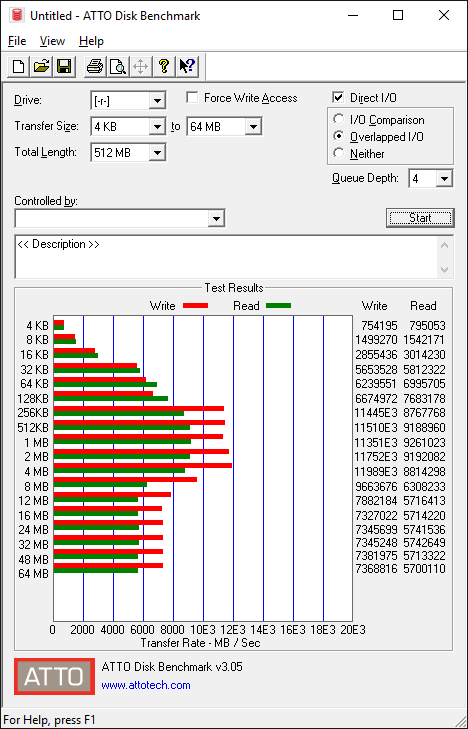
dBpoweramp R15.3: We convert 500 FLAC encoded music files (14.4GB) into Apple Lossless encoded files for playback on Apple devices. As no lossy compression is taking place this minimizes the CPU workload while maximizing the amount of data written to the destination drive. Unfortunately this test would show more variance in results for systems with greater than four cores as dBpoweramp will fully load any size processor.
IOmeter – The most powerful piece of storage testing software freely available, IOmeter allows the creation of practically any kind of test workload. We first utilize it to dirty every new SSD before we test the basics of every solid-sate drive, namely random 4K read and writes as well as 2MB sequential read and write performance.
Footnote – Disk I/O Tracing
If you are still reading our benchmark profile, thank you! It is not easy to devise tests that can tax a modern solid-state drive so if you have any suggestions or know of any software that you would like to see added to our test regimen please let us know. We are especially eager to add disk I/O recording and playback to replace the batch file testing we utilized in past storage reviews but we are still working out how to make this possible. If you know of a piece of software that is free or doesn’t cost a few grand please do drop us a note!
Futuremark PCMark 8
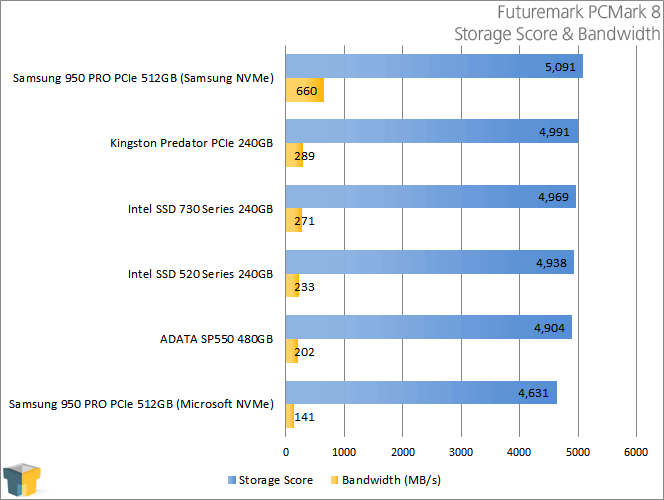
| ADATA SP550 | Intel 520 | Intel 730 | Kingston Predator | Samsung 950 PRO (Samsung NVMe) | |
| World of Warcraft | 59s | 58s | 58s | 58s | 57s |
| Battlefield 3 | 134s | 134s | 133s | 133s | 131s |
| Photoshop Light | 114s | 117s | 115s | 112s | 110s |
| Photoshop Heavy | 374s | 367s | 364s | 355s | 351s |
| Adobe InDesign | 60s | 58s | 58s | 57s | 55s |
| Adobe After Effects | 71s | 71s | 70s | 71s | 70s |
| Adobe Illustrator | 72s | 72s | 72s | 72s | 71s |
| Microsoft Word | 28s | 28s | 28s | 28s | 28s |
| Microsoft Excel | 9s | 9s | 9s | 9s | 9s |
| Microsoft PowerPoint | 9s | 9s | 9s | 9s | 9s |
The SP550 480GB slots in behind the other SSDs here, though not by very much despite its TLC flash and budget controller. As the first true budget SSD to grace our test rig it unfortunately isn’t pitted in a fair fight.
That said the SP550 posts identical times as the Intel drives in most of the games and utilities. The notable exception are the Photoshop tests where the drives swap positions. For gaming we can see load times only differ by three seconds between the SP550 and the fastest M.2 SSD in our tests, indicating ADATA’s SP550 has solid potential as a cheap gaming rig drive.
Iometer 2010 1.1.0
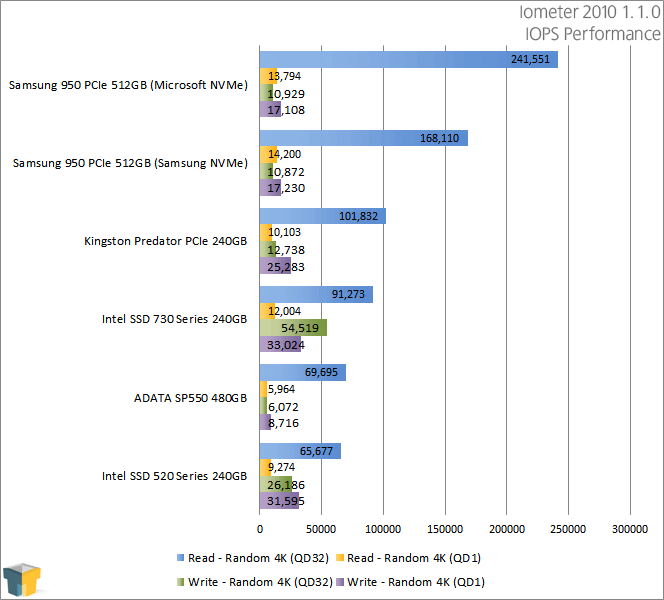
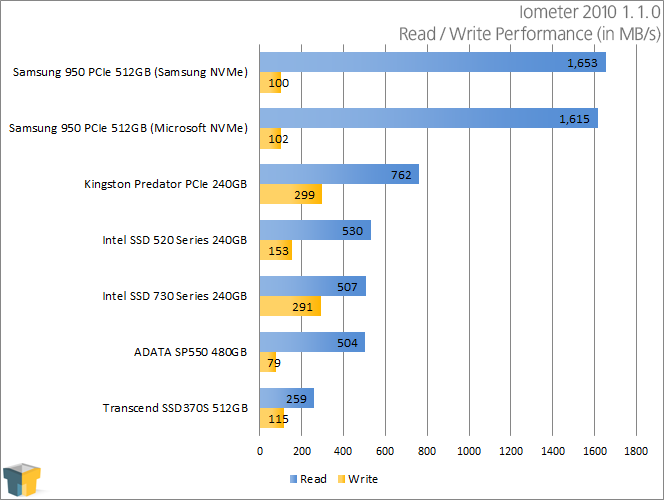
One thing to keep in mind is Iometer creates a test file that spans the entire size of the SSD. So it should come as no surprise that this effectively negates the SLC caching performance of the drive. What we are seeing is probably close to the raw TLC performance of the drive without any of the SLC performance benefit.
Despite being the only budget drive in our graphs the SP550 acquits itself well, able to turn in Random 4K reads above the Intel 520 which used to be Intel’s flagship SSD a few years back. Sequential read performance is fairly close as well, with the SP550 effectively drawing even with the newer 730 Series drive.
AS SSD
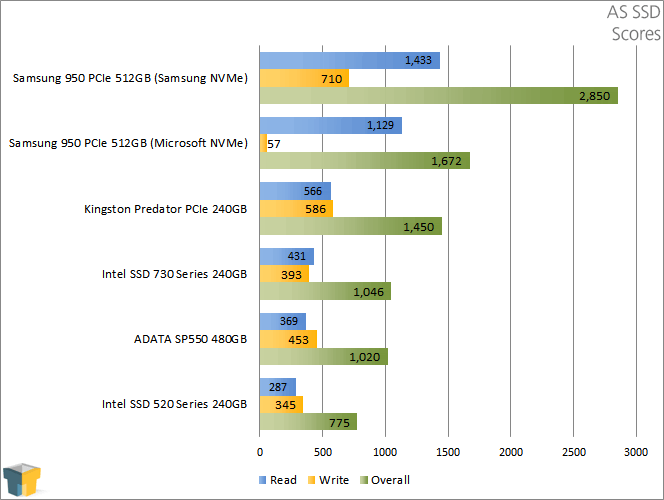
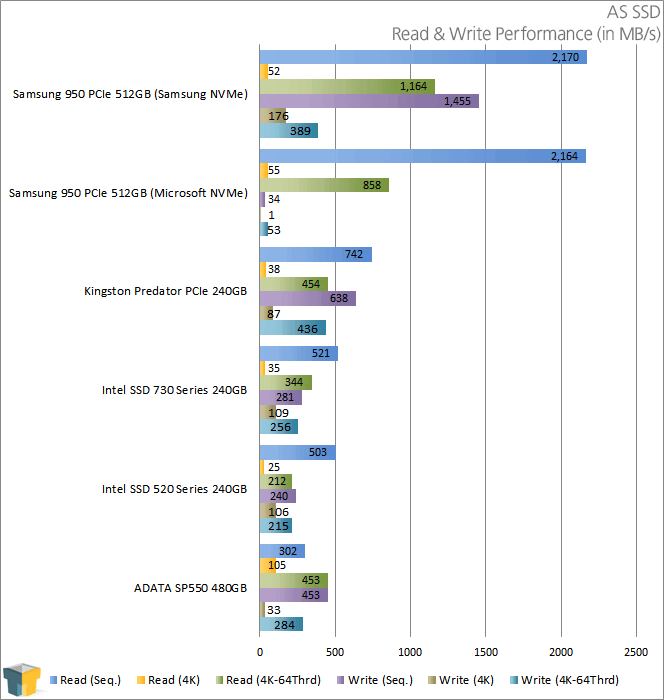
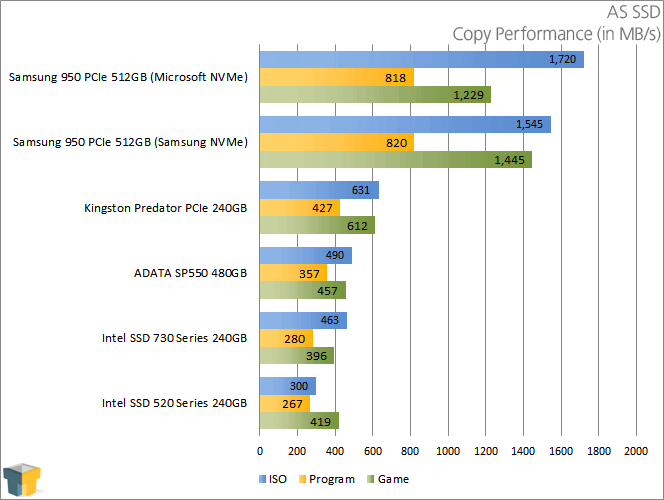
| AS SSD – Latencies | Read | Write |
| ADATA SP550 (480GB) | 0.035ms | 0.034ms |
| Intel 520 (240GB) | 0.110ms | 0.173ms |
| Intel 730 (240GB) | 0.032ms | 0.032ms |
| Kingston Predator (240GB) | 0.041ms | 0.047ms |
| Samsung 950 PRO (Microsoft NVMe) | 0.027ms | 2.670ms |
| Samsung 950 PRO (Samsung NVMe) | 0.023ms | 0.021ms |
With AS SSD we see the benefits of the SLC caching allowing the SP550 to compete directly against previous flagship SSDs from Intel and even turn in results at times besting much faster drives.
AS SSD’s file copy benchmarks play directly into the benefits of fast-write SLC cache, allowing ADATA’s entry-level drive to wedge itself in at the top of the SATA SSDs and under the M.2 Predator SSD. Interestingly access latency with AS SSD remains a very respectable 0.03ms on average.
Support our efforts! With ad revenue at an all-time low for written websites, we're relying more than ever on reader support to help us continue putting so much effort into this type of content. You can support us by becoming a Patron, or by using our Amazon shopping affiliate links listed through our articles. Thanks for your support!




